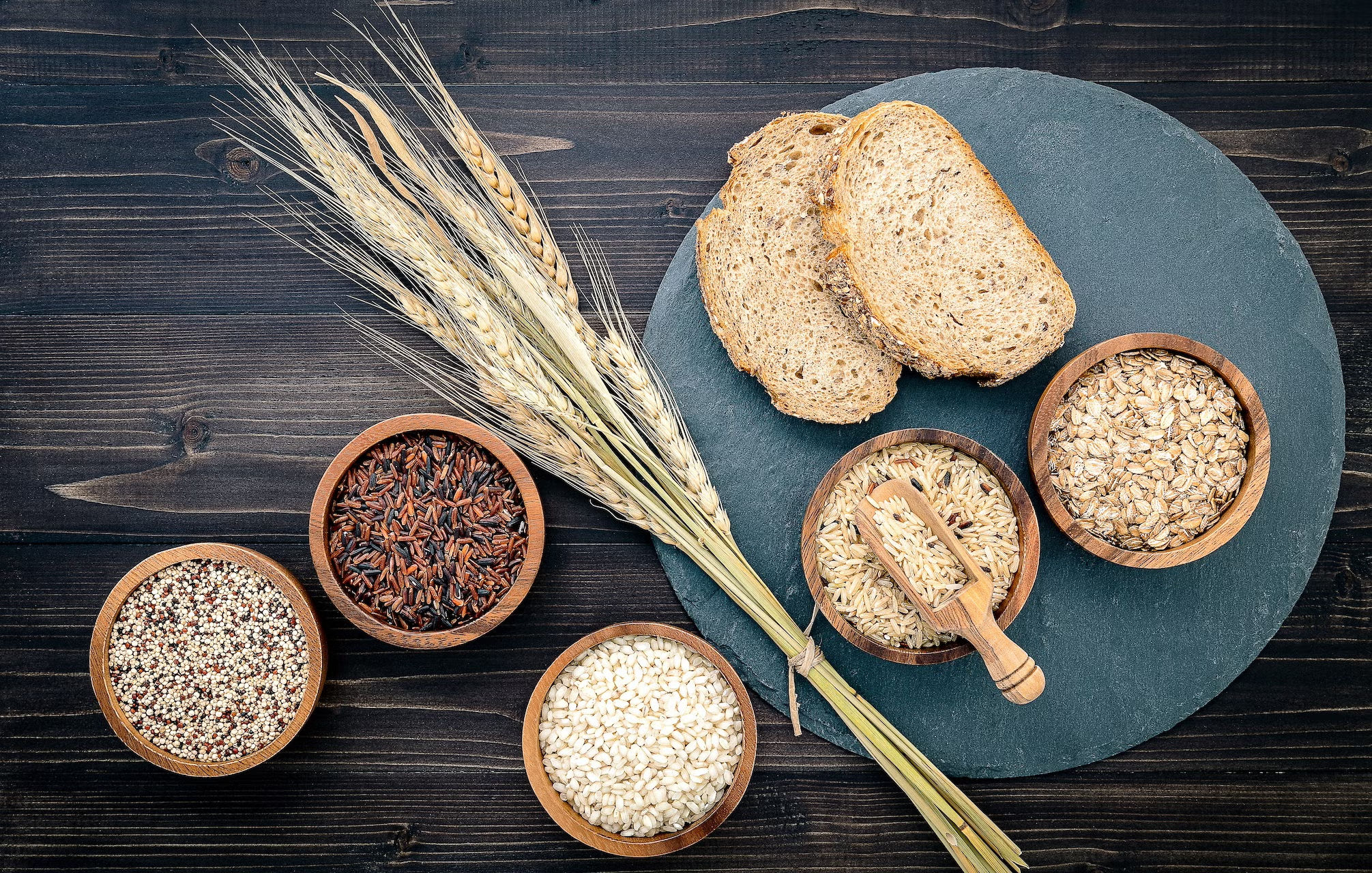
Whole grains are a nutritional powerhouse, offering a wide array of health benefits that go beyond basic nutrition. Packed with fiber, vitamins, and antioxidants, they support digestive health, reduce the risk of chronic diseases, and promote overall well-being. Adding whole grains to your diet can make a significant impact on your health, providing long-lasting energy and supporting vital body functions.
From enhancing heart health to boosting cognitive performance, whole grains are a simple yet powerful way to improve your life. Research shows that they play a key role in preventing conditions like heart disease, diabetes, and even certain cancers. The benefits are clear whole grains are a must-have for a healthier, more vibrant life.
1. Improves Digestive Health
Whole grains are an excellent source of dietary fiber, which plays a crucial role in promoting digestive health. The fiber found in whole grains adds bulk to stool and helps regulate bowel movements, reducing the risk of constipation. Additionally, the fiber in whole grains acts as a prebiotic, nourishing the beneficial bacteria in the gut.
A healthy gut microbiome is essential for proper digestion, nutrient absorption, and even immune function. By supporting the growth of good bacteria, whole grains work synergistically with natural sources of probiotics, such as yogurt and fermented vegetables, to enhance gut health and overall well-being.
2. Supports Heart Health
Whole grains have been shown to improve heart health by lowering cholesterol levels and reducing the risk of cardiovascular diseases. The high fiber content in whole grains, especially soluble fiber, helps to reduce levels of LDL (bad) cholesterol by binding to cholesterol particles in the digestive system and eliminating them. This can lead to a healthier lipid profile, lowering the risk of heart disease and stroke.
3. Regulates Blood Sugar Levels
One of the key benefits of whole grainsis their ability to help regulate blood sugar levels. Unlike refined grains, which are quickly absorbed and can cause rapid spikes in blood sugar, whole grains have a low glycemic index (GI), meaning they are absorbed more slowly. This helps prevent the sharp rises and falls in blood glucose levels, making whole grains an excellent option for people with diabetes or those trying to prevent it.
4. Aids In Weight Management
Whole grains play a significant role in weight management due to their high fiber content, which promotes feelings of fullness. The fiber in whole grains helps regulate appetite by increasing satiety and reducing overall calorie intake. When consumed as part of a balanced diet, whole grains can help control hunger, making it easier to stick to a healthy eating plan and avoid overeating. Pairing whole grains with leafy greens, such as spinach, kale, and swiss chard, can further enhance their weight management benefits by adding more fiber, vitamins, and minerals while keeping calorie intake low.
5. Reduces Inflammation
Chronic inflammation is linked to several health conditions, including heart disease, arthritis, and diabetes. Whole grains contain anti-inflammatory compounds like polyphenols, flavonoids, and antioxidants, which help to reduce inflammation in the body. These compounds work by neutralizing free radicals, which can cause oxidative stress and inflammation.
6. Helps Prevent Type 2 Diabetes
Regular consumption of whole grains has been associated with a lower risk of developing Type 2 diabetes. The fiber in whole grains helps improve insulin sensitivity and glucose metabolism, which can prevent the onset of diabetes. Whole grains also help regulate blood sugar levels, reducing the risk of insulin resistance, a key factor in the development of Type 2 diabetes.
7. Supports Healthy Blood Pressure
Whole grains have been shown to have a positive effect on blood pressure. The fiber, antioxidants, and potassium found in whole grains help improve vascular health and maintain proper blood pressure levels. Studies have demonstrated that eating whole grains, such as oats and barley, can reduce both systolic and diastolic blood pressure.
8. Promotes Healthy Skin
The nutrients in whole grains, such as vitamins, minerals, and antioxidants, contribute to healthy, glowing skin. The B-vitamins found in whole grains, including niacin, riboflavin, and thiamine, help maintain skin health by supporting the production of collagen, improving skin texture, and reducing the appearance of fine lines.
9. Reduces Cancer Risk
Whole grains contain several bioactive compounds, including antioxidants and fiber, that may help reduce the risk of cancer. Research suggests that whole grains, particularly those high in fiber, can help lower the risk of colorectal cancer by improving digestion and reducing inflammation in the gut. Fiber promotes regular bowel movements, which can help remove potential carcinogens from the colon.
10. Boosts Energy Levels
Whole grains provide a steady, sustained source of energy throughout the day due to their complex carbohydrates. Unlike refined grains, which cause a quick spike in blood sugar followed by a crash, whole grains release glucose slowly into the bloodstream. This gradual release of energy helps maintain consistent energy levels, making whole grains an excellent choice for staying energized throughout the day.
11. Improves Cognitive Function
Whole grains support brain health by providing important nutrients such as B-vitamins, magnesium, and antioxidants. These nutrients are essential for maintaining cognitive function, memory, and concentration. B-vitamins, in particular, help to improve neural communication and boost brain energy. The fiber in whole grains also plays a role in cognitive health by promoting a healthy gut microbiome, which has been shown to influence brain function.
12. Enhances Endurance
Whole grains provide a long-lasting source of energy, making them ideal for enhancing physical endurance. The complex carbohydrates in whole grains fuel muscles during exercise, providing the energy needed for prolonged physical activity. Eating whole grains before a workout ensures that you have a steady supply of energy to sustain you throughout the exercise.
13. Supports Healthy Cholesterol Levels
Whole grains, particularly oats, are rich in beta-glucan, a soluble fiber that has been shown to help reduce LDL (bad) cholesterol levels. By binding to cholesterol in the digestive tract, beta-glucan helps prevent its absorption into the bloodstream. As a result, regular consumption of whole grains can lower total cholesterol and reduce the risk of cardiovascular disease.
14. Improves Gut Health
Whole grains are a powerful source of prebiotic fiber, which feeds beneficial bacteria in the gut. A balanced gut microbiome is essential for optimal digestive health, immune function, and overall well-being. Prebiotic fiber in whole grains promotes the growth of healthy gut bacteria such as bifidobacteria and lactobacilli.
This not only supports digestion but also helps maintain a healthy immune system. When combined with probiotic-rich foods, such as kefir, kimchi, and sauerkraut, whole grains can create a more balanced and resilient gut microbiome, enhancing overall health.
15. Strengthens Immune Function
The nutrients in whole grains, such as zinc, magnesium, and antioxidants, play an important role in supporting the immune system. Zinc is crucial for immune cell function and helps the body fight infections. The antioxidants found in whole grains protect cells from oxidative stress, which can damage the immune system over time.
16. Helps Detoxify The Body
Whole grains support the body’s natural detoxification process by promoting regular bowel movements. The fiber in whole grains binds to waste products and toxins in the digestive system, helping to eliminate them from the body. This process supports overall detoxification, as a clean and efficient digestive system helps rid the body of harmful substances.
17. Promotes Bone Health
Whole grains are an excellent source of magnesium, a mineral that is crucial for strong bones and teeth. Magnesium works in conjunction with calcium and vitamin D to promote bone density and prevent osteoporosis. Studies have shown that diets rich in whole grains are associated with better bone health, as magnesium supports bone formation and helps regulate calcium levels in the body.
18. Supports Healthy Pregnancy
Whole grains are an important part of a healthy pregnancy diet due to their high folate content. Folate is a B-vitamin that plays a critical role in fetal development, reducing the risk of birth defects and supporting overall healthy pregnancy outcomes. Whole grains also provide other essential nutrients, such as iron, magnesium, and fiber, that support both the mother and baby during pregnancy.
19. Balances Hormone Levels
Whole grains help balance hormone levels by providing fiber, vitamins, and minerals that support endocrine function. The fiber in whole grains helps regulate blood sugar levels, which can affect hormonal balance, particularly insulin and cortisol. In women, whole grains have been shown to reduce symptoms of hormonal imbalances, such as those associated with PMS, by stabilizing blood sugar and providing essential nutrients for hormonal regulation.
20. Improves Sleep Quality
Whole grains, particularly those rich in magnesium and B-vitamins, can help regulate sleep patterns and improve sleep quality. Magnesium has a calming effect on the nervous system and helps relax muscles, making it easier to fall asleep. B-vitamins, especially vitamin B6, also contribute to healthy sleep by supporting the production of neurotransmitters like serotonin and melatonin, which regulate sleep cycles.
The Nutritional Value Of Whole Grains
Whole grains are unrefined and contain all three parts of the grain kernel: the bran, germ, and endosperm. This means they are richer in nutrients compared to refined grains, which have been processed to remove these valuable components. The nutritional benefits of whole grains include:
- Fiber: Whole grains are packed with dietary fiber, which promotes digestive health, helps control blood sugar levels, and keeps you feeling full longer.
- Vitamins: Whole grains are a good source of B-vitamins (such as niacin, thiamine, and riboflavin), which help with energy production and overall metabolic function.
- Minerals: They also provide essential minerals like magnesium, iron, and zinc, which are vital for heart health, immune function, and muscle performance.
- Antioxidants: Whole grains contain antioxidants such as phenolic acids, which help protect the body from oxidative damage.
Some common examples of whole grains include oats, quinoa, brown rice, barley, farro, and buckwheat. These grains can easily be incorporated into a wide range of meals to enhance their nutritional value.
How To Incorporate More Whole Grains Into Your Diet
Including more whole grains in your daily meals can be easy and delicious. Here are some tips:
- Swap refined grains for whole grains: Replace white rice with brown rice, or use whole wheat bread instead of white bread.
- Add grains to salads: Quinoa, farro, or barley make great additions to salads, adding texture and nutritional value.
- Try whole grain pasta: Whole wheat pasta is a simple way to enjoy the benefits of whole grains in your favorite pasta dishes.
- Experiment with breakfast: Start your day with oatmeal, quinoa porridge, or whole grain toast to boost your fiber intake.
FAQs
What Are The Best Sources Of Whole Grains?
The best sources of whole grains include oats, quinoa, brown rice, barley, farro, bulgur, and whole wheat.
Can Whole Grains Help With Weight Loss?
Yes, the high fiber content in whole grains helps increase satiety, which can reduce overeating and contribute to weight management.
How Much Whole Grain Should I Eat Per Day?
It’s recommended to consume at least 3 servings of whole grains per day, but the exact amount depends on your age, activity level, and overall diet.
Are Whole Grains Gluten-free?
No, most whole grains contain gluten. However, gluten-free options like quinoa, rice, and buckwheat are available.
Can I Eat Whole Grains If I Have Diabetes?
Yes, whole grains are a great option for people with diabetes because they have a low glycemic index and help regulate blood sugar levels.
Conclusion
Whole grains offer numerous health benefits, from better digestion and heart health to increased energy and weight management. By replacing refined grains with whole grains, you’re making a smart choice for your long-term health. They’re easy to incorporate into meals and provide a simple yet effective way to improve your well-being.


